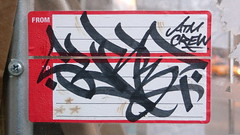
Mirsky’s mother is laughing. She is laughing great peals of laughter. If his mother had a gut she would split it. If she had tears they would be running down her cheeks—if she had cheeks. She’d be slapping her knee in laughter— if there was a knee or a hand to slap it.
His mother is dead. She has been dead for a long time, but now, finally now, she can rest in peace—up there in seventh heaven.
Her wish has finally come true. Her curse has come true. Both one and the same.
“You should have one just like you,” she would say to Mirsky at the drop of a hat with no provocation at all. Whenever anything was bothering her she would look his way as if to blame him and say it.
And for good measure—“If there’s a God above then you should have twins just like you. Or, almost too much to hope for—triplets.”
Did she wish Mirsky one just like him when he had his picture in the paper for saving the kitten from drowning in the pond? They called him a young local hero. She called him a schmuck for risking his life for a dumb animal. Did his mother wish him one just like him when he won the art award at the sixth-grade assembly? “What good is drawing a tree?” She asked.
“Why couldn’t you win the science award?” Did she wish Mirsky one just like him for winning the essay contest in eighth grade, the hundred-yard dash as a freshman, or the home run crown in the Babe Ruth League?
It must have slipped her mind.
But now it’s different. She knows that he has one just like him. She always knew he would. Of course. It was inevitable. The inevitable’s name is Julie and to add to the connection she is named after Mirsky’s mother in the Jewish tradition of using the same first initial to honor a departed loved one. Janice was his mother’s name. He also has a son. She was still alive when David was born. The first call Mirsky made when he got out of the delivery room was to his mother.
“Mom,” he yelled excitedly into the phone. “I’m a father! It’s a boy. And he’s beautiful.”
“Mazel tov,” she said. “He should be just like you.” Then she hung up.
Mirsky’s mother is having the time of her death. JulieJulieJulie. She must love saying the name over and over.
Julie is not a bad girl. She is however, street smart, wily, totally loyal to her friends, who come before anyone and everyone. She is harder to pin down than a watermelon seed and getting her to agree on anything is like trying to nail Jell-O to the wall with a ten-penny nail. She can find a loop-hole in the waterproof ass of a frog and twist any previous agreement by quoting one word either in or out of context. She is not disrespectful. She is not exactly respectful either. She just is. Mirsky did not just fall off a turnip truck—but he cannot beat this kid with a Louisville Slugger.
“Don’t you remember,” she said recently. “I told you two months ago that I was going to the Metallica concert this Thursday.”
“No,” Mirsky said, “I don’t remember any such conversation.”
“At your age you forget everything,” she says.
And so it goes. Day after day. And it’s on these kinds of days that he misses his wife most. Elaine will come back—they always return to each other and act as if nothing unusual has happened. It’s been six months so far, and that’s the longest either has taken off from the family.
Mirsky was never home as a boy—there was always somewhere to go and something to do. Julie’s the same. He never had homework. His Mother always asked and he always told her, “No homework today, Mom,” or, “I finished it in school.” Mirsky got the grades he did because he earned them. Once, after a brutally bad report card, he told his mother he failed because the teachers didn’t like his accent.
“Accent! What the hell are you talking about accent? You were born and raised right here in Connecticut.” Mirsky’s Mother, a shade under five feet tall stood toe to toe with him, her head tilted back, yelling up at her son. Their profiles were mirror images, long foreheads, nose bump in the same place, and their hair— kinky and mousy brown—so exact as if to be interchangeable.
“That’s what they hate, Mom,” he told her. “That’s why they won’t give me good grades.”
“You deserve to have a kid just like you. I hope you have a large family and they are all like you. I hope they look like you, act like you, and have accents like you.”
“But Mom, I don’t have an accent.”
“Are you telling me that your teachers are liars?” she asked.
Ping and Pong—Mirsky and his Mother sparring through conversations. Testing and pushing, deeper and deeper—never having a quiet, calm discourse. Their personalities were as identical as their hair.
“OK, I’ll tell you what they really don’t like about me and why they won’t give me good grades,” Mirsky said.
“I can’t wait. Tell me,” she said, arms folded.
“Promise you won’t get mad.”
“Why should I get mad?” she asked, already fuming.
“Promise?”
“OK. I promise.”
“It’s not my accent they hate—it’s yours.”
“What are you talking about? I don’t have an accent.”
“See, I knew you’d get mad.”
“I’m not mad—but I don’t have an accent.”
“I’m flunking because of you and you’re not even mad at my teachers,” Mirsky tells her. “You never stick up for me.”
Mirsky’s mother is laughing this week because his daughter brought home a shirtless boy with a leather vest, four earrings, a tattoo, a nipple ring and hair down to his waist. She met him at the concert, Julie said. Mirsky told her that he could only stay for dinner and she threw it back to him that he’d always said her friends were welcome.
“He is welcome to stay for dinner,” Mirsky told her. “Pick a bowl and let me know which corner he wants to eat in.”
Julie stormed up to her room, leaving her new best friend in the family room watching “Gilligan’s Island.” She kept out of Mirsky’s sight for three days, but Trevor, his house guest, stayed and ate and watched TV and slept on the floor. He never acknowledged Mirsky’s presence except to tell him as he was leaving on the fourth day that he didn’t deserve to have a daughter as good as Julie.
Mirsky’s mother would be getting a good belly laugh over this. He has to go to school to meet with the principal and Julie’s English teacher. Julie was supposed to write a poem and plagiarized one instead.
“It’s not true, Dad,” she said. “I did write the poem. I can’t help it if I’m a natural.”
Julie held out til the end. She kept her story up a lot longer than most could have.
“She’s just like you,” he heard his mother say repeatedly during the conference. Julie finally told the truth. Her version, but she only cracked when her English teacher pulled a copy of Walt Whitman’s “Leaves of Grass” from her desk drawer.
“I went to the library and grabbed an old dusty book off the bottom shelf and copied a poem. I figured that since it was so old no one would have heard of it and I’d be OK.”
Mirsky had to suppress a smile and his own laughter, hiding them behind a few coughs.
“JustlikeyouJustlikeyouJustlikeyou,” Mirsky knew his Mother was saying between fits of laughter and probably pointing he and Julie out to her friends and saying, “she’sjustlikehimshe’sjustlikehim.”
The following day Julie showed up with a kitten.
“What’s that?” Mirsky asked.
“C’mon, Dad. Even you know a kitten when you see one. You promised me that I could have a kitten if I made honors.”
Mirsky told her that he didn’t remember that conversation and said, “But you didn’t make honors anyway.”
“Technically, that’s correct,” she said. “But with this kitten around to remind me, I will make honors next time”
“Technically, the kitten goes,” he told her.
“You never keep your promises,” she whined.
Mirsky knew that his mother was watching. She knew what was coming and was laughing— waiting to hear the words. She never had as much enjoyment when she was living. Finally, Mirsky stood and walked over to where Julie was sitting and held his hands above her head and intoned, “In the tradition of our people, carried on by our family, a tradition passed down from parent to child, from generation to generation, begun somewhere in some far off land, a tradition as important in the life-cycle rite of passage as Bat Mitzvah, first date, and the inevitable birthday check from the grandparents . . .”
“Ha ha ha,” his mother laughed. “Ha ha ha.” She knows what’s about to happen. She knows that he is about to break a solemn vow that he made to himself many times over the years.
“What’s the point?” Julie asked.
Mirsky continued, “Julie, my little girl, my ray of sunshine, I want you to know that I will pray every day that you should have what I have. I want you to share my joy and experiences. You should have a child just like you.”
He turned and walked a few steps and then turned back towards Julie. She had a tear in her eye. She got up and walked over to him, and gave him the kind of hug she did when she was a little girl.
“Thanks, Dad. That’s the nicest thing you’ve said to me in a very long time.”
“You’re welcome,” Mirsky said. “You can keep the kitten.”
end
Paul Beckman is a real estate salesman, a writer, snorkeler, traveler ad photographer. He specializes in short story, flash & micro fiction. He received and MFA from Bennington College. Some of his publishing credits include: The Connecticut Review, Playboy, Other Voices, Web Del Sol, Jewish Currents, Monkey Bicycle, Exquisite Corpse, Opium and Thug Lit.
Photo by Adam Lawrence.
Street Art by SURE, a Marine who recently lost his life in Afghanistan. For more about SURE please check out the following video.
Led to Sea is the work of L. Alex Guy, and this track comes from her latest album Into The Darkening Sky which was released by Eleven Records.

No comments:
Post a Comment